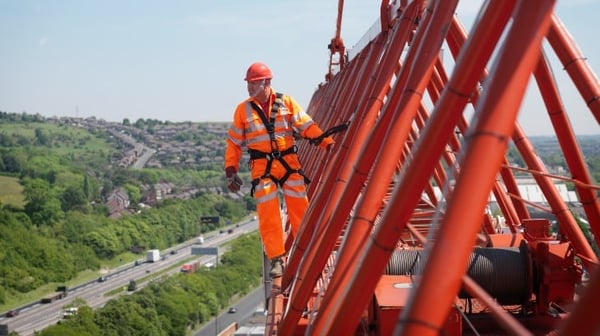Does your job affect your life insurance?
When you apply for life insurance we ask questions about your health, lifestyle, medical and family history. But how do our jobs affect a life insurance policy? In this article we’ll explore the relationship between life insurance and different occupations.

You might also be interested in...
It depends on what job you do. When you apply we'll check if you work within a short list of occupations, for example in the Armed Forces or outside at heights over 15 metres, so we can consider whether it is a dangerous job that may affect your life insurance policy. The affect could be a restriction on when we can pay a claim or a higher cost compared to someone in a less hazardous job. If any restrictions do apply, we'll let you know before your cover starts.
If your job could be considered dangerous or hazardous, it may mean that a claim is more likely to be made on your life insurance policy, and therefore your monthly premiums may be higher.
While personal safety can sometimes feel subjective, as far as a life insurance provider is concerned, there are risk factors associated with certain professions that increase the likelihood of an unforeseen death. To balance the greater risk of a payout, the insurer would charge higher premiums.
Here are some examples of where a job can affect a life insurance policy:
- You regularly work outside at heights over 15 metres
- You are in the Armed Forces or Reserves
- You work underground or underwater
- You are a pilot or member of a flight crew
- You take part in motorsport driving or motorcycle riding
- You work offshore in the oil, gas or fishing industry
- You work as a full time barman, barmaid or landlord in a public house
While the following jobs will not necessarily prevent you from getting life insurance, we thought it was interesting to take a look at some of the professions considered the most dangerous jobs in the UK.
- Roofer. Even with modern safety equipment, working at heights presents risks that aren’t borne by those with their feet firmly on the ground. And roofers face other risks too – from exposure to electric cables to burns from chemicals.
- HGV driver. Many people enjoy life on the road as a heavy goods vehicle (HGV), bus or coach driver, but it could also be considered one of the most dangerous UK jobs. The sheer amount of time spent driving – with tiredness increasing the chance of collisions – means HGV drivers may end up paying higher life insurance premiums.
- Firefighter. While protective equipment can reduce the hazards firefighters face, there is nevertheless evidence that firefighters face health risks from smoke inhalation, workplace injuries and exposure to harmful substances.
- Police officer. In the past there have sadly been police officer fatalities in the UK, making it arguably one of the more dangerous jobs. Not only do officers face the risk of injury during challenging encounters, but other hazards include high speed collisions and the impact of the job on mental health.
- Maritime workers. People who work at sea, such as deckhands, fishers and oil platform workers, face an increased exposure to risk. Hazards include adverse weather and slippery surfaces, while the sheer distance from medical facilities on land presents a challenge.
Yes, when you apply for life insurance, you should be truthful about your occupation when asked. If not, any future life insurance claim could be invalidated if you originally gave incorrect information.
Once you have submitted your life insurance application, you may be asked to give further details about your work. This might include:
- A summary of your duties.
- What percentage of your job involves these duties.
- Any workplace injuries you have sustained.
After you’ve submitted this information, your insurer may analyse statistics or studies to determine how risky your job is. They will then make a final decision on whether to offer you life insurance, and how much the premiums will be.
You may find it difficult to get life insurance if you work in a dangerous profession, but it’s worth remembering that the insurer will take into account a number of other factors, including your age, smoker status and any pre-existing conditions.
If you work in the armed forces, for example, you will need to complete an armed forces questionnaire before applying for life insurance. Legal & General policies do not usually exclude war risks, but you may be charged higher premiums if you carry out activities such as bomb disposal or aviation.
If you find you’re unable to get life insurance due to your dangerous job, you may be able to find specialist insurers that provide high risk life insurance. Please speak with a financial adviser if you need any help.
If you are employed you might receive Death in Service benefit – an occupational benefit provided by some employers, where your named beneficiaries would receive a lump sum if you were to die during your employment. Check with your employer if you don't know what you are entitled to.
Yes, if you are covered by life insurance and you work in a dangerous occupation, your policy will pay out following your death provided a valid claim has been made; for example, the premiums will need to have been paid, and the information provided at the time of the application will need to be correct.
Additionally, if your life insurance policy includes Critical Illness Cover, you could receive a payout if you make a valid claim while covered by the policy, if diagnosed with a specified critical illness at work (or elsewhere), which could include the loss of a limb, your hearing or sight Note that you would only be eligible for a payout provided there is no exclusion relating to your occupation.